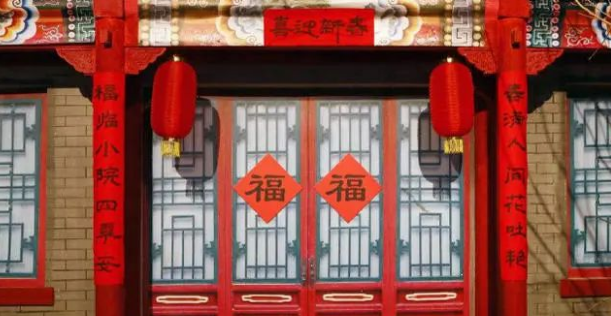As the Spring Festival approaches, every household adorns their doors with Chinese New Year couplets, which feature auspicious words to bring good luck and prosperity for a vibrant new year. However, do you know that there’s more to it than meets the eye? The simple act of贴春联 (applying Spring Festival couplets) has its own set of customs and taboos. Misplacing your couplets might not bring good fortune but could actually invite misfortune. So, if you aim for a smooth and lucky new year, it’s essential to learn about the taboos of applying Chinese New Year couplets!

Do Not Misplace Upper and Lower Scrolls
When applying Spring Festival couplets, many people mistakenly place the upper and lower scrolls in the wrong positions。 The correct way is: facing the door or wall column, the right side should have the upper scroll (upper couplet), while the left side has the lower scroll (lower couplet)。 This tradition stems from ancient times when writing was done from right to left, and couplets followed this convention as well。
How to distinguish between upper and lower scrolls? The key lies in the last character of each scroll。 According to the rules of couplet composition, the last character of the upper scroll must be a oblique tones (zè shēng) tone – which corresponds to the third or fourth tones in modern Mandarin。 In contrast, the last character of the lower scroll must be a level tone (p í ng sh ē ng) tone – corresponding to the first or second tones.
Avoid Placing New Couplets Over Old Ones
In Chinese folklore, Spring Festival couplets are believed to be heavenly deities。 From the moment they are applied, these deities descended to the household。 When the couplets are torn away, their mission is complete, and they return to heaven to report the family’s situation to the Jade Emperor。
Thus, it’s advisable not to apply new couplets directly over old ones。 Instead, you should tear the old couplets first, allowing the old deities to ascend and making way for the new ones to arrive。 This practice symbolizes renewal and transition。 Ideally, this ritual should be performed during the period of the day from 7 a。 m。 to 9 a。 m (Chen Shi), which corresponds to 7:00 AM to 9:00 AM。
Auspicious with Odd Numbers
While Chinese culture generally values paired items as auspicious, Spring Festival couplets are an exception。 Single-digit scrolls bring good fortune。 In feng shui terms, odd numbers represent yang (positive energy), while even numbers symbolize yin (negative energy)。 If your couplets have an even number of characters, they may inadvertently invite inauspicious energies。 Hence, it’s best to choose couplets with odd character counts to ensure good luck。
Steer Clear of Inauspicious Words
When selecting your Spring Festival couplets, avoid those with words or phrases that carry negative connotations。 Instead, opt for couplets filled with auspicious meanings and well-chosen words。 This ensures the New Year starts on a positive note and brings harmony to your household。
By following these customs and avoiding common taboos, you can not only beautify your home but also ensure that your Spring Festival celebrations are filled with joy, luck, and prosperity!
Leave a Reply